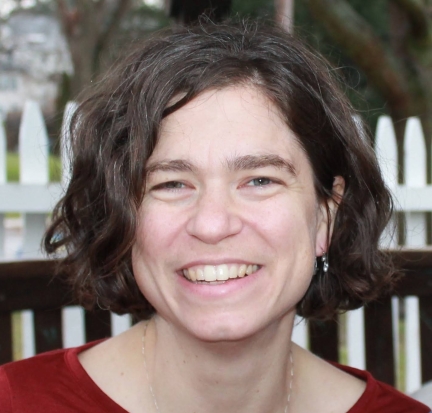Shelby Kimmel
she/her
Associate Professor of Computer Science

- Office
- 75 Shannon 210
- Tel
- (802) 443-5832
- skimmel@middlebury.edu
- Office Hours
- Mon: 2-3:30, Thur: 3:30-4:30, Fri: 11:00-12:00
Courses Taught
CSCI 0200
Math Foundations of Computing
Course Description
Mathematical Foundations of Computing
In this course we will provide an introduction to the mathematical foundations of computer science, with an emphasis on formal reasoning. Topics will include propositional and predicate logic, sets, functions, and relations; basic number theory; mathematical induction and other proof methods; combinatorics, probability, and recurrence relations; graph theory; and models of computation. (CSCI 0145 or CSCI 0146 or CSCI 0150) (Juniors and Seniors by waiver) 3 hrs. lect./lab
Terms Taught
Requirements
CSCI 0302
Current
Algorithms and Complexity
Course Description
Algorithms and Complexity
This course focuses on the development of correct and efficient algorithmic solutions to computational problems, on the underlying data structures to support these algorithms, and on the social implications of algorithms. Topics include computational complexity, analysis of algorithms, proof of algorithm correctness, some advanced data structures, algorithmic techniques including greedy and dynamic programming, and the consequences of real-world applications of algorithms. The course complements the treatment of NP-completeness in CSCI 0301. (CSCI 0200 and CSCI 0201) 3 hrs. lect./disc.
Terms Taught
Requirements
CSCI 0333
Quantum Computing
Course Description
Quantum Computing
In this course we will explore how quantum mechanics can be applied to problems in communications, algorithms, detection, and cryptography. We will learn how features such as entanglement, superposition, and no-cloning can sometimes give quantum systems an advantage over standard “classical” computers. We will also discuss the current situation and challenges facing experimental quantum computers, as well as the limits of quantum computing. No previous experience with quantum mechanics is required. (MATH 0200 or CSCI 0200) 3 hrs lect./disc.
Terms Taught
Requirements
CSCI 0401
Computational Complexity
Course Description
Computational Complexity
We will investigate the computational power of various resources. Examples include determining whether a computer with limited time or limited space can solve more difficult problems, attempting to characterize creativity as a resource, and comparing probabilistic and quantum computation. We will learn why we do not yet have answers to many of the most fundamental questions in computational complexity (like whether P=NP), and we will think critically about the value of studying these topics. Students enrolled in the College Writing (CW) section of the course will explore these ideas through writing, in particular, in three contexts that are critical for theoretical computer science: the proof (expert audience), the review paper (non-expert computer science audience), and the popular science article (educated public audience). (CSCI 0301).3 hrs. sem./1 hr. disc.
Terms Taught
Requirements
CSCI 0500
Current
Upcoming
Advanced Study
Course Description
Advanced Study
Individual study for qualified students in more advanced topics in computer science theory, systems, or application areas. Particularly suited for students who enter with advanced standing. (Approval required) 3 hrs. lect.
Terms Taught
CSCI 0505
Current
Upcoming
Independent Study
Course Description
Independent Study
Individual study for qualified students in more advanced topics in computer science theory, systems, or application areas. Particularly suited for students who wish to pursue further study beyond a previous CS elective or research project, and where the scope of the work fits best in a 1/2 credit experience rather than a 1-credit independent project or a 2-credit senior thesis.
Terms Taught
CSCI 0702
Upcoming
Senior Thesis
Course Description
Senior Thesis
The senior thesis is recommended for students interested in pursuing graduate study in Computer Science. Students will spend the semester researching and writing, and developing and experimenting as appropriate for their topic. All students will be expected to report on their work in the form of a written thesis, a poster, and an oral presentation at the end of the semester. In addition, throughout the semester, students will meet as a group to discuss research and writing, and will be expected to attend talks in the Computer Science lecture series. Before approval to join the class is granted, students are expected to have chosen a thesis adviser from the CSCI faculty, and determined a thesis topic with the guidance and approval of that adviser. (Approval required) 3 hrs. lect./disc.
Terms Taught
FYSE 1055
Transforming Traditions
Course Description
Transforming Traditions
How do traditions transform when they expand beyond the time and place of their origin? In considering this question we will interrogate the value of authenticity, consider concerns of appropriation, and examine the impacts of new perspectives on existing practices. Course material (readings, videos, and recordings) will focus on the Korean percussion genres pungmul and samulnori. However, students will draw on their own traditions, interests, and experiences for discussions and assignments. Weekly in-class drumming practices will culminate in a performance at the end of the semester. No prior musical experience is needed but must have a willingness to bang vigorously on a drum in a group.
Terms Taught
Requirements
